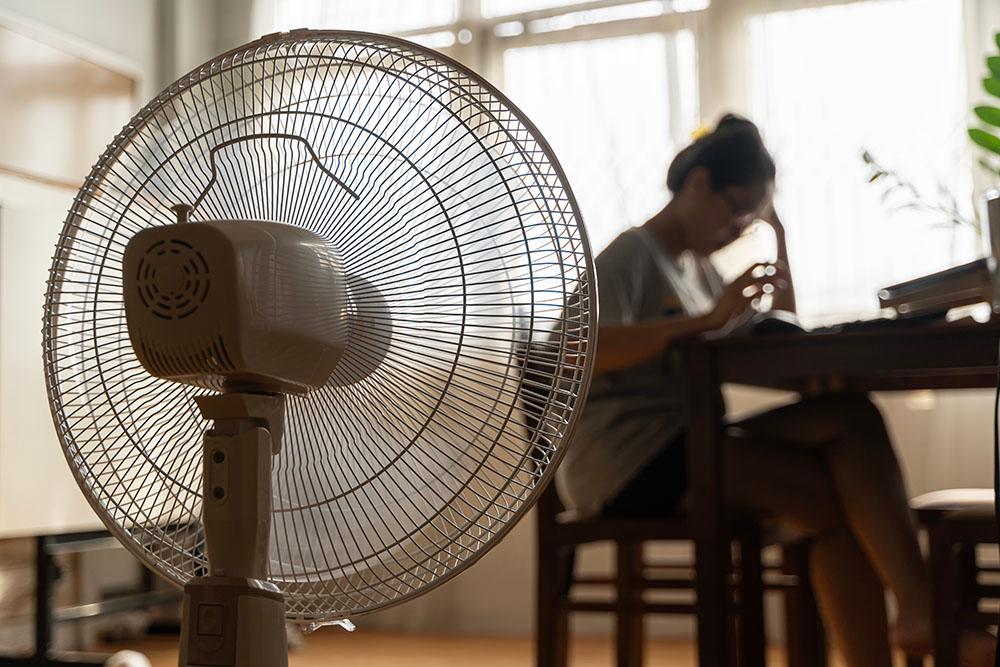How Is Climate Change Affecting Mould Growth?

CONTENTS
- Climate change causing damp and mould
- Extreme heat and its impact on mould
- Shifting ecosystems and their influence on mould
- Indoor air quality and the threat of mould
- The built environment's vulnerability to mould
- Future projections for climate change and mould interactions
- Mitigation strategies for managing mould in a changing climate
- Frequently asked questions
- Get in touch
Climate change, with its unpredictable patterns and extreme events, is creating the perfect storm for mould growth. The relationship between climate change and mould affects ecosystems, air quality, our buildings and human health.
Our ICE Cleaning professionals are on hand to quickly provide adept mould removal services. All traces of mould will be eliminated by applying advanced methods and equipment. Our extensive measures and lifetime guarantee* work to ensure mould does not come back.
Read on to learn more about how shifting climates fuel mould proliferation, why certain buildings are vulnerable targets, and understand what future projections suggest about this under-recognised hazard.
*subject to advisories
Climate change causing damp and mould
Rising temperatures cause increased humidity levels, which give rise to optimal environments for mould growth. Mould does not need much to survive and even thrives in winter, but warmth and moisture are integral to its growth.
Climate change contributes to both because warmer air can hold more water vapour, leading to higher humidity levels.
Floods are dramatic examples of weather events linked with climate change that create the perfect environment for mould infestations. Once floodwater retreats from buildings, the dampness left behind becomes a factor in its growth.
Storms and hurricanes also damage property structures, allowing spores easy access to our homes. Mould is unsightly and poses serious health risks. Exposure to damp and mouldy conditions can cause breathing difficulties, allergic reactions or even asthma in some cases.
Extreme heat and its impact on mould
As temperatures increase in the UK due to El Niño and climate change, mould can still become an issue and may rival wet and cold conditions. When the temperature rises and moisture levels are high, it creates a perfect environment for mould to thrive.
When it is hot outside, you need good ventilation systems. They keep the indoors dry and less inviting for mould spores. Summer often leads to high pollen levels, which contain mould spores. By using standing fans, extraction fans, air conditioning or air purifiers, you can lower the levels of spores in the air.
Shifting ecosystems and their influence on mould
Climate change is also about how ecosystems shift, allowing for mould growth. Ecosystem shifts happen when local climates get hotter or wetter, leading to changes in plant and animal life. This can create conditions that are ripe for mould growth.
Rising temperatures often lead to increased humidity. More moisture means an environment where mould loves to grow. Mould thrives in damp areas, such as forests with high rainfall or homes with poor ventilation. When climate change pushes up humidity levels, it creates a haven for mould.
Trees play a vital role in keeping our air clean but are threatened by changing weather patterns. Studies have shown that intense storms caused by climate change result in more fallen trees. These fallen trees become the perfect breeding ground for various types of mould spores due to decay.
Bird migration paths are shifting because of warming climates; this has surprising implications for the spread of mould spores across different regions. Birds carry spores on their feathers during migration, spreading them further than before.
Indoor air quality and the threat of mould
Climate change also creates another problem that is not always easy to spot but poses a serious threat to indoor air quality. Mould spores are tiny organisms, invisible to the naked eye, and have an enormous impact on human health.
Breathing in these spores can lead to all sorts of effects, from allergic reactions like sneezing or skin rashes to more severe respiratory problems for those with weakened immune systems.
The key issue here is exposure duration - living in an environment full of microscopic airborne allergens, will inevitably affect your health over time. We need practical solutions to help keep our indoor environments healthy even amidst changing climates.
This can involve steps as simple as improving home ventilation, using dehumidifiers in damp areas of the house, or regularly checking and cleaning spots where mould grows unseen - behind furniture, under carpets or around windows.
The built environment's vulnerability to mould
Mould benefits from climate change, making our constructed environment more susceptible than ever. Our buildings are vulnerable to mould, as materials we use in construction - like wood, plasterboard or concrete – all offer an environment for mould when conditions are right.
With climate change tipping the scales towards higher humidity and warmer temperatures, these conditions become the norm rather than the exception. Unfortunately, mould is everywhere; it is part of nature's decomposition process.
Under favourable conditions, mould can grow exponentially, eating away at organic material such as wood or wallpaper adhesive and causing significant structural damage if left unchecked.
Our changing global weather patterns benefit mould by increasing condensation within buildings, leading to dampness and increasing indoor humidity where mould thrives best.
From using mould-resistant materials in construction to employing more efficient ventilation systems, these solutions keep the indoor environment dry and less hospitable for mould.
Future projections for climate change and mould interactions
As we continue to pump greenhouse gases into the atmosphere, scientists predict an increase in mould-related health issues such as allergies and respiratory problems. Homes, schools, and workplaces could become hotbeds of fungal growth.
In extreme cases where climate change leads to flooding events, buildings are infested with toxic mould species like black mould. This toxic form releases mycotoxins, which can cause severe health effects.
We are already seeing signs of ecosystems struggling under increased mould prevalence due to shifts induced by climate change. Warmer climates allow certain fungi types to thrive over others, disrupting delicate ecological balances.
The materials we use to build our homes and offices may also play a part in encouraging rampant mould growth.
Some building materials provide sustenance for spores when combined with changing climatic conditions. Studies suggest certain insulation types are particularly prone, like fibreglass or cellulose.
Beneath the challenges, there is still hope. As we face a growing mould threat, our understanding of it also expands. Continuous work and studies are being developed regarding more effective mould remediation.
Mitigation strategies for managing mould in a changing climate
We are learning that temperature and humidity directly influence mould growth. By keeping track of local weather patterns, we can predict when conditions might become ripe for mould development.
Research has shown that using dehumidifiers or air conditioning during periods of high humidity can help keep indoor environments safe from unwanted mould growth.
Taking preventive measures is preferable to treating the problem after it has occurred. Using insulation materials resistant to moisture absorption, like closed-cell foam insulation, is one preventive measure to consider. This helps stop water vapour from getting trapped inside walls.
Besides material choices, maintaining good ventilation also plays a key role in prevention strategies by ensuring any damp areas dry out quickly before they get the chance to breed spores.
Incorporating resilience against future changes forms the cornerstone of long-term mitigation plans. ClimateCHIP's tool provides detailed projections about heat-related health risks, including factors influencing potential mould outbreaks. With foresight and correct measures, we can keep our homes mould-free.
Frequently asked questions
Does climate change cause mould?
Yes, shifting weather patterns linked to climate change create conditions that let mould flourish, both indoors and outdoors.
How does climate change affect fungi?
Rising temperatures due to climate change promote faster fungal growth and spore production, impacting ecosystems and built environments.
How do you know if mould is making you sick?
Symptoms like persistent coughing, skin rashes, watery eyes or sinus congestion could suggest a reaction to indoor mould exposure. Always consult a healthcare professional for advice.
How does mould affect the environment?
Mould contributes positively to nature by breaking down dead material. But when unchecked indoors it can degrade air quality and damage structures.
Get in touch
If you are struggling with mould in your home, our technicians at ICE Cleaning will step up to the job. Our mould remediation services ensure that mould is eliminated from your property, and our tools to prevent future growth can protect your home forever.
For a free, no-obligation quote and site survey, contact our team today at 0208 066 0360 or enquiries@icecleaning.co.uk. Our mould cleaning team operate nationwide, 365 days a year, and is on-call 24/7 to tend to your needs and assist you.

Speak with me today,
I’m here to help
By asking you a few questions either via phone or email I can immediately provide a realistic estimation of the cost.
You’re in good company. We’ve cleaned for the following commercial clients… View all

Why choose us?
- Cater to a wide variety of cleaning situations
- Nationwide coverage, available 24/7
- Cater to commercial and domestic clients
- Free survey provided prior to quotation
- Emergency response team
- Offer a bespoke service designed to suit all your needs
- All technicians hold professional health and safety qualifications, including BICSc, IOSH, Dewpoint Professional & Safe Contractor
We’re fully accredited
We place best practise, professional expertise and health and safety at the core of our business. We’re fully compliant with all legal obligations. You can view a list of our accreditations below, or visit our Health & Safety page for more information.











-RGB-small.1707319151.jpg)




















